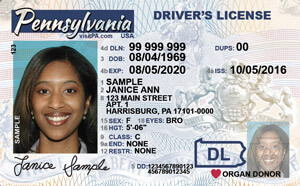- Updated for March 2025
- Based on official Pennsylvania 2025 Driver's manual
Free Pennsylvania DOT Motorcycle Permit Practice Test 2025
To legally ride motorcycles in Pennsylvania, you must apply for a motorcycle learner’s permit. This credential is issued after passing a vision test, paying the necessary fees, and passing a motorcycle knowledge exam. After obtaining a learner’s permit, you can practice and build your riding skills for up to one year. When ready, you can either take a skills test or complete a training course through the motorcycle safety program to obtain a Class M license. If the learner’s permit expires, you can apply for another one for a maximum of three times within a five-year period. However, those under 18 years of age must obtain consent from a parent or guardian, hold a permit for at least six months, complete a motorcycle safety program course, and complete 65 hours of supervised riding, including 15 hours through the motorcycle safety program course.
The official motorcycle knowledge exam consists of 20 multiple-choice questions based on the official DOT motorcycle operator manual (Pennsylvania Motorcycle Manual). To pass, you must score at least 80%. We recommend dedicating the following weeks to studying the various aspects of riding theory. Becoming a safe and responsible rider in Pennsylvania takes more than passing exams. Build the foundation for your riding skills with the help of our Pennsylvania DOT motorcycle permit practice tests. This intuitive tool has been a game changer for students who seek a different approach to learning. Each practice test consists of 30 multiple-choice questions based on the official motorcycle operator manual.
The “Test settings” menu on the left side of the page contains several features, including the voice-over function. Once activated, an artificial voice will read the questions and answer choices aloud. To help beginners who are unfamiliar with this subject, we provide a detailed explanation for each question. By receiving immediate feedback, students can identify mistakes and strengthen their knowledge without having to wait until the practice test ends.
We understand that you’re eager to discover Pennsylvania’s landscapes and natural beauty. To do it on two wheels, patience and consistency are crucial. Unlike the roads of Pennsylvania, the learning phase does not have a speed limit. While our practice tests will boost your learning potential, it is crucial to avoid rushing and only proceed once you are confident you can apply this knowledge to real-world scenarios.
- Perfect for learner’s permit, driver’s license, and Senior Refresher Test
- Triple-checked for accuracy
What you need to know

What to expect on the actual PA DOT exam
questions
correct answers to pass
passing score
minimum age to apply
List of questions (classic view)
- For an adequate space cushion, maintain a following distance of at least ____ second(s) behind the vehicle ahead of you.
- Your riding abilities can be affected by just ______ alcoholic drink(s).
- The best eye and face protection is provided by
- You should adjust your side mirrors
- A benefit of riding in the center lane position is that it
- If you are riding in a staggered formation, when should you switch to riding in pairs?
- You should maintain an adequate space cushion around your motorcycle
- In a normal turn, you should
- Adjust your side mirrors so you will be able to see
- To carry cargo on a motorcycle, you should
- Instruct your passenger to
- Use both the front and rear brakes
- If you make eye contact with a driver at an intersection,
- If your front wheel locks, you should
- In a slow, tight turn, you should
- Half of all motorcycle crashes are caused by
- Where is the engine cut-off switch located?
- Alcohol affects the body in many different ways, but it first affects your
- The best way to be seen by other vehicle operators is to
- Which lane position should ALWAYS be avoided?
- When carrying a passenger, your motorcycle will
- What is a good strategy for detecting bumps in a road at night?
- To avoid hazardous situations, you should
- How can you increase your visibility to others at night?
- In which of the following situations should you increase your following distance?
- What should you do on Step 3 of passing?
- When you are being passed from behind,
- Which portion of the lane should you be in before starting to pass?
- What should you do to avoid colliding with a vehicle cutting in?
- As you are riding, an object appears suddenly in your path. What should you do?
- Alabama: Test 1 / Test 2
- Alaska: Test 1 / Test 2
- Arizona: Test 1 / Test 2
- Arkansas: Test 1 / Test 2
- California: Test 1 / Test 2
- Colorado: Test 1 / Test 2
- Connecticut: Test 1 / Test 2
- Delaware: Test 1 / Test 2
- District of Columbia: Test 1 / Test 2
- Florida: Test 1 / Test 2
- Georgia: Test 1 / Test 2
- Hawaii: Test 1 / Test 2
- Idaho: Test 1 / Test 2
- Illinois: Test 1 / Test 2
- Indiana: Test 1 / Test 2
- Iowa: Test 1 / Test 2
- Kansas: Test 1 / Test 2
- Kentucky: Test 1 / Test 2
- Louisiana: Test 1 / Test 2
- Maine: Test 1 / Test 2
- Maryland: Test 1 / Test 2
- Massachusetts: Test 1 / Test 2
- Michigan: Test 1 / Test 2
- Minnesota: Test 1 / Test 2
- Mississippi: Test 1 / Test 2
- Missouri: Test 1 / Test 2
- Montana: Test 1 / Test 2
- Nebraska: Test 1 / Test 2
- Nevada: Test 1 / Test 2
- New Hampshire: Test 1 / Test 2
- New Jersey: Test 1 / Test 2
- New Mexico: Test 1 / Test 2
- New York: Test 1 / Test 2
- North Carolina: Test 1 / Test 2
- North Dakota: Test 1 / Test 2
- Ohio: Test 1 / Test 2
- Oklahoma: Test 1 / Test 2
- Oregon: Test 1 / Test 2
- Pennsylvania: Test 1 / Test 2
- Rhode Island: Test 1 / Test 2
- South Carolina: Test 1 / Test 2
- South Dakota: Test 1 / Test 2
- Tennessee: Test 1 / Test 2
- Texas: Test 1 / Test 2
- Utah: Test 1 / Test 2
- Vermont: Test 1 / Test 2
- Virginia: Test 1 / Test 2
- Washington: Test 1 / Test 2
- West Virginia: Test 1 / Test 2
- Wisconsin: Test 1 / Test 2
- Wyoming: Test 1 / Test 2
Your go-to, trusted source
Experience the Driving-Tests differenceOur commitment to accuracy and quality in our practice tests
Explore our rigorous, multi-tiered verification process that ensures each question mirrors the official manual for unparalleled accuracy.

At Driving-Tests.org, we understand the importance of reliable and accurate practice tests to help you prepare for your DMV exam. That's why we've developed a meticulous process to create and continually update our practice questions, ensuring they reflect the most current driving laws and regulations.
Here's an inside look at how we maintain the highest quality in our practice tests.
Content Creation and Verification Process
- Alignment with Official Manuals:
Every question we develop is based on the most recent version of each state's official driving manual. Our team regularly monitors each state DMV's website for the latest updates to ensure our practice tests are always aligned with the most current information. - Community Feedback Integration:
We leverage feedback from our vast community of users to understand which topics are most frequently tested. This helps us focus on the areas that are most relevant and beneficial for your preparation. - Expert Content Creation:
Our in-house editor, Steven, who has extensive experience in driver education, crafts each question with precision. He conducts a thorough review of each question against the official manuals to ensure accuracy. - Rigorous Review Process:
Once Steven has finalized a set of questions, our team conducts a joint review session. This second level of scrutiny involves content accuracy, proofreading, and fact-checking to eliminate any errors. - User Feedback Mechanism:
After a question goes live on our site, we keep the lines of communication open. Each question features a feedback button, inviting users to report any issues or errors. This continuous feedback loop allows us to address and rectify any concerns promptly. - Responsive Updates:
In line with our commitment to accuracy, we quickly update our practice questions to reflect any changes in the DMV manuals. Additionally, we update the free electronic copy of the state's driver's license manuals on our site, typically within a few days after the DMV publishes them.
Our thorough quality control process ensures that you have access to practice tests that are as accurate and up-to-date as possible. We believe in the power of well-prepared drivers and are dedicated to providing you with the best study tools to help you succeed on your DMV exam.
Pass the First Time. Guaranteed.
Be fully prepared in days, not weeks. Get full access to our entire program, starting at $49.
950 Exam-Like Questions
Unlock state-specific questions vetted by DMVs and seen on the official exam.
Industry-Leading 97% Success Rate
Compare with the average US passing rate of 49%.
Trusted by over 1.15 Million customers
The only program recommended by DMVs.

